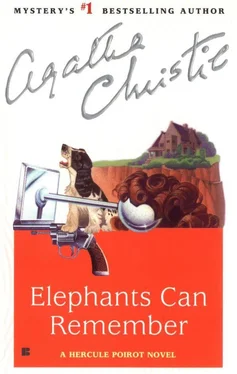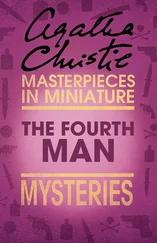Agatha Christie - Elephants Can Remember
Здесь есть возможность читать онлайн «Agatha Christie - Elephants Can Remember» весь текст электронной книги совершенно бесплатно (целиком полную версию без сокращений). В некоторых случаях можно слушать аудио, скачать через торрент в формате fb2 и присутствует краткое содержание. Год выпуска: 2004, ISBN: 2004, Издательство: Berkley, Жанр: Классический детектив, на английском языке. Описание произведения, (предисловие) а так же отзывы посетителей доступны на портале библиотеки ЛибКат.
- Название:Elephants Can Remember
- Автор:
- Издательство:Berkley
- Жанр:
- Год:2004
- ISBN:ISBN-13: 978-0425067826
- Рейтинг книги:3 / 5. Голосов: 1
-
Избранное:Добавить в избранное
- Отзывы:
-
Ваша оценка:
- 60
- 1
- 2
- 3
- 4
- 5
Elephants Can Remember: краткое содержание, описание и аннотация
Предлагаем к чтению аннотацию, описание, краткое содержание или предисловие (зависит от того, что написал сам автор книги «Elephants Can Remember»). Если вы не нашли необходимую информацию о книге — напишите в комментариях, мы постараемся отыскать её.
Elephants Can Remember — читать онлайн бесплатно полную книгу (весь текст) целиком
Ниже представлен текст книги, разбитый по страницам. Система сохранения места последней прочитанной страницы, позволяет с удобством читать онлайн бесплатно книгу «Elephants Can Remember», без необходимости каждый раз заново искать на чём Вы остановились. Поставьте закладку, и сможете в любой момент перейти на страницу, на которой закончили чтение.
Интервал:
Закладка:
"I know," said Mrs. Oliver, "one word."
"Nothing," said Poirot.
"Exactly," said Mrs. Oliver. "I know that is the simple and proper thing to do. Nothing. It's darned cheek to go and tell a girl who's my goddaughter what her future mother-in-law is going about saying and asking people. But-"
"I know," said Poirot, "it is human curiosity."
"I want to know why that odious woman came and said what she did to me," said Mrs. Oliver. "Once I knew that I could relax and forget all about it. But until I know that…"
"Yes," said Poirot, "you won't sleep. You'll wake up in the night and, if I know you, you will have the most extraordinary and extravagant ideas which presently, probably, you will be able to make into a most attractive crime story. A whodunit-a thriller. All sorts of things."
"Well, I suppose I could if I thought of it that way," said Mrs. Oliver. Her eyes flashed slightly.
"Leave it alone," said Poirot. "It will be a very difficult plot to undertake. It seems as though there could be no good reason for this."
"But I'd like to make sure that there is no good reason."
"Human curiosity," said Poirot. "Such a very interesting thing." He sighed. "To think what we owe to it throughout history. Curiosity. I don't know who invented curiosity. It is said to be usually associated with the cat. Curiosity killed the cat. But I should say really that the Greeks were the inventors of curiosity. They wanted to know. Before them, as far as I can see, nobody wanted to know much. They just wanted to know what the rules of the country they were living in were, and how they could avoid having their heads cut off or being impaled on spikes or something disagreeable happening to them. But they either obeyed or disobeyed. They didn't want to know why. But since then a lot of people have wanted to know why and all sorts of things have happened because of that. Boats, trains, flying machines and atom bombs and penicillin and cures for various illnesses. A little boy watches his mother's kettle raising its lid because of the steam. And the next thing we know is we have railway trains, leading on in due course to railway strikes and all that. And so on and so on."
"Just tell me," said Mrs. Oliver, "do you think I'm a terrible nosey-parker?"
"No, I don't," said Poirot. "On the whole I don't think you are a woman of great curiosity. But I can quite see you getting in a het-up state at a literary party, busy defending yourself against too much kindness, too much praise. You ran yourself instead into a very awkward dilemma, and took a very strong dislike to the person who ran you into it."
"Yes. She's a very tiresome woman, a very disagreeable woman."
"This murder in the past of this husband and wife who were supposed to get on well together and no apparent sign of a quarrel was known. One never really read about any cause for it, according to you?"
"They were shot. Yes, they were shot. It could have been a suicide pact. I think the police thought it was at first. Of course, one can't find out about things all those years afterwards."
"Oh, yes," said Poirot, "I think I could find out something about it."
"You mean-through the exciting friends you've got?"
"Well, I wouldn't say the exciting friends, perhaps. Certainly there are knowledgeable friends, friends who could get certain records, look up the accounts that were given of the crime at the time, some access I could get to certain records."
"You could find out things," said Mrs. Oliver hopefully, "and then tell me."
"Yes," said Poirot, "I think I could help you to know at any rate the full facts of the case. It'll take a little time, though."
"I can see that if you do that, which is what I want you to do, I've got to do something myself. I'll have to see the girl.
I've got to see whether she knows anything about all this, ask her if she'd like me to give her mother-in-law-to-be a raspberry, or whether there is any other way in which I can help her.
And I'd like to see the boy she's going to marry, too."
"Quite right," said Poirot. "Excellent."
"And I suppose," said Mrs. Oliver, "there might be people-" She broke off, frowning.
"I don't suppose people will be very much good," said Hercule Poirot. "This is an affair of the past. A cause celebre, perhaps at the time. But what is a cause celebre when you come to think of it? Unless it comes to an astonishing denouement, which this one didn't. Nobody remembers it."
"No," said Mrs. Oliver, "that is quite true. There was a lot about it in the papers and mentions of it for some time, and then it just-faded out. Well, like things do now. Like that girl, the other day. You know, who left her home and they couldn't find her anywhere. Well, I mean, that was five or six years ago and then suddenly a little boy, playing about in a sand heap or a gravel pit or something, suddenly came across her dead body. Five or six years later."
"That is true," said Poirot. "And it is true that knowing from the body how long it is since death and what happened on the particular day and going back over various events of which there is a written record, one may in the end turn up a murderer. But it will be more difficult in your problem since it seems the answer must be one of two things: that the husband disliked his wife and wanted to get rid of her, or that the wife hated her husband or else had a lover. Therefore, it might have been a passionate crime or something quite different. Anyway, there would be nothing, as it were, to find out about it. If the police could not find out at the time, then the motive must have been a difficult one, not easy to see.
Therefore it has remained a nine days' wonder, that is all."
"I suppose I can go to the daughter. Perhaps that is what that odious woman was getting me to do-wanted me to do.
She thought the daughter knew-well, the daughter might have known," said Mrs. Oliver. "Children do, you know. They know the most extraordinary things."
"Have you any idea how old this goddaughter of yours would have been at the time?"
"Well, I have if I reckon it up, but I can't say offhand. I think she might have been nine or ten, but perhaps older, I don't know. I think that she was away at school at the time.
But that may be just my fancy, remembering back what I read."
"But you think Mrs. Burton-Cox's wish was to make you get information from the daughter? Perhaps the daughter knows something, perhaps she said something to the son, and the son said something to his mother. I expect Mrs. Burton-Cox tried to question the girl herself and got rebuffed, but thought the famous Mrs. Oliver, being both a godmother and also full of criminal knowledge, might obtain information.
Though why it should matter to her, I still don't see," said Poirot. "And it does not seem to me that what you call vaguely 'people' can help after all this time," He added, "Would anybody remember?"
"Well, that's where I think they might," said Mrs. Oliver.
"You surprise me," said Poirot, looking at her with a somewhat puzzled face. "Do people remember?"
"Well," said Mrs. Oliver. "I was really thinking of elephants."
"Elephants?" As he had thought often before, Poirot thought that really Mrs. Oliver was the most unaccountable woman. Why suddenly elephants?
"I was thinking of elephants at the lunch yesterday," said Mrs. Oliver.
"Why were you thinking of elephants?" said Poirot with some curiosity.
"Well, I was really thinking of teeth. You know, things one tries to eat, and if you've got some sort of false teeth-well, you can't do it very well. You know, you've got to know what you can eat and what you can't."
"Ah!" said Poirot with a deep sigh. "Yes, yes. The dentists, they can do much for you, but not everything."
"Quite so. And then I thought of-you know-our teeth being only bone and so not awfully good, and how nice it would be to be a dog, who has really ivory teeth. And then I thought of anyone else who has ivory teeth, and I thought about walruses and-oh, other things like that. And I thought about elephants. Of course when you think of ivory, you do think of elephants, don't you? Great big elephant tusks."
Читать дальшеИнтервал:
Закладка:
Похожие книги на «Elephants Can Remember»
Представляем Вашему вниманию похожие книги на «Elephants Can Remember» списком для выбора. Мы отобрали схожую по названию и смыслу литературу в надежде предоставить читателям больше вариантов отыскать новые, интересные, ещё непрочитанные произведения.
Обсуждение, отзывы о книге «Elephants Can Remember» и просто собственные мнения читателей. Оставьте ваши комментарии, напишите, что Вы думаете о произведении, его смысле или главных героях. Укажите что конкретно понравилось, а что нет, и почему Вы так считаете.












